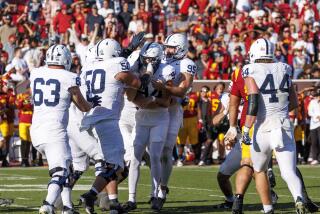Trojans battling through midseason blues: Four takeaways from USC’s win against Cal
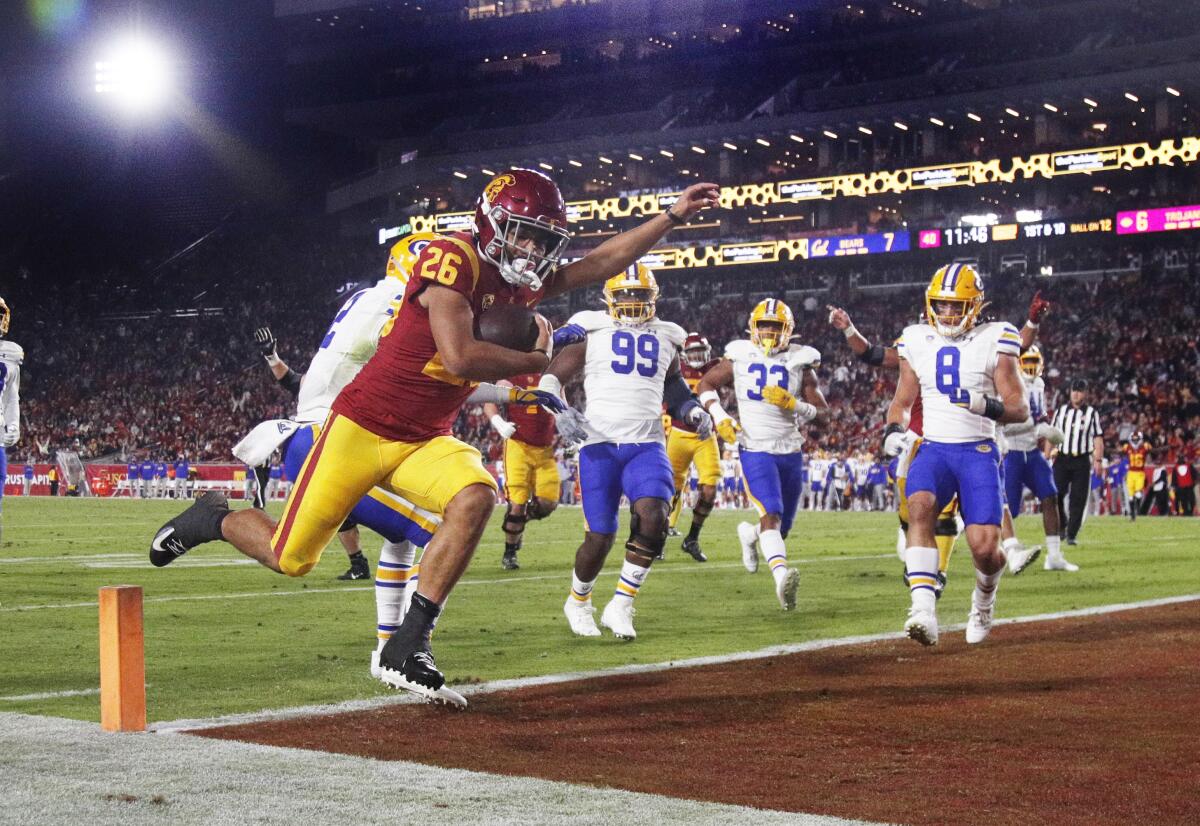
- Share via
It wasn’t complacency. Travis Dye warned against that particular road block several weeks ago. What the USC running back experienced after USC’s unexpectedly tight 41-35 victory over California on Saturday was something else.
Frustration.
“We’re just not playing to our full potential,” said Dye, who had 98 yards on the ground and one touchdown to extend his scoring streak to eight consecutive games. “And it’s there. We are a hair away, a third down away, a stop away, a catch away from just blowing teams out.”
A strong performance by Caleb Williams helps No. 9 USC overcome another lackluster defensive effort in a 41-35 victory over California.
What looked like a mismatch on paper turned into a one-possession game when USC’s offense sputtered and its defense turned in yet another uneven performance. The team that started the season looking poised for a record-breaking turnaround under first-year coach Lincoln Riley is now slogging through midseason muck.
Here are four takeaways from USC’s win:
Third-down difference
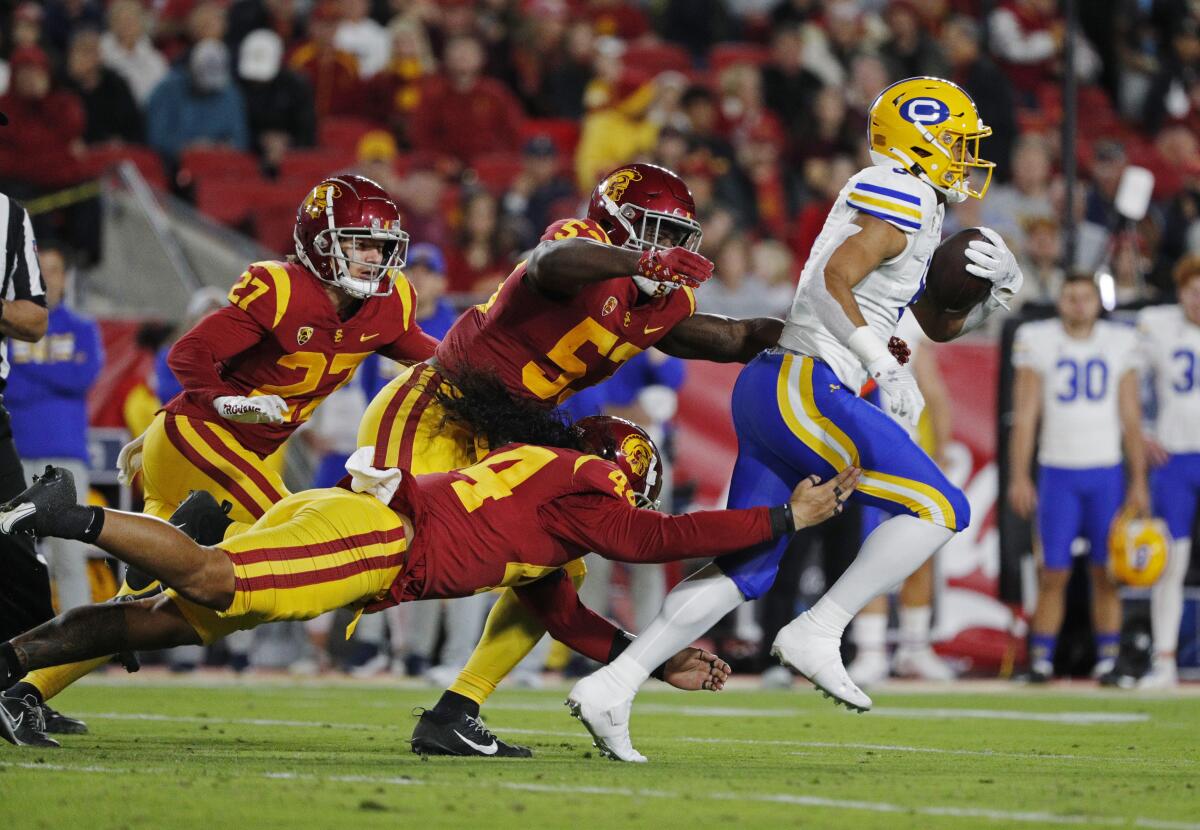
USC (8-1, 6-1 Pac-12) entered the game as the second-best third-down offense in the country, converting on 54.7% of third-down tries, but it was Cal, one of the worst third-down teams in the country, that won the key battle Saturday.
The Bears, converting 34.8% of their third-down tries before Saturday, kept the chains moving on eight of 15 third downs against USC, their highest conversion percentage of the season against a Football Bowl Subdivision opponent. Meanwhile, USC connected on just five of 12 third-down attempts.
Linebacker Shane Lee lamented allowing easy third-and-short situations, but it was Cal (3-6, 1-5) that had a longer third-down distance to go than USC. Even with an average of 8.6 yards to gain on third down compared to USC’s 6.8, the Bears converted on three of six tries with nine or more yards while USC moved the chains on only one of four third-and-long situations. Cal quarterback Jack Plummer completed 12 of 13 passes on third down and finished with 406 yards and three touchdowns on 35 of 49 passing.
Caleb Williams, who had 360 yards and four touchdowns with one rushing score, was just two of eight on third down but used his legs to convert the game’s most important try. He rushed for 15 yards on third and five with 2:11 left in the fourth quarter to help USC run out the clock.
Defense dragging
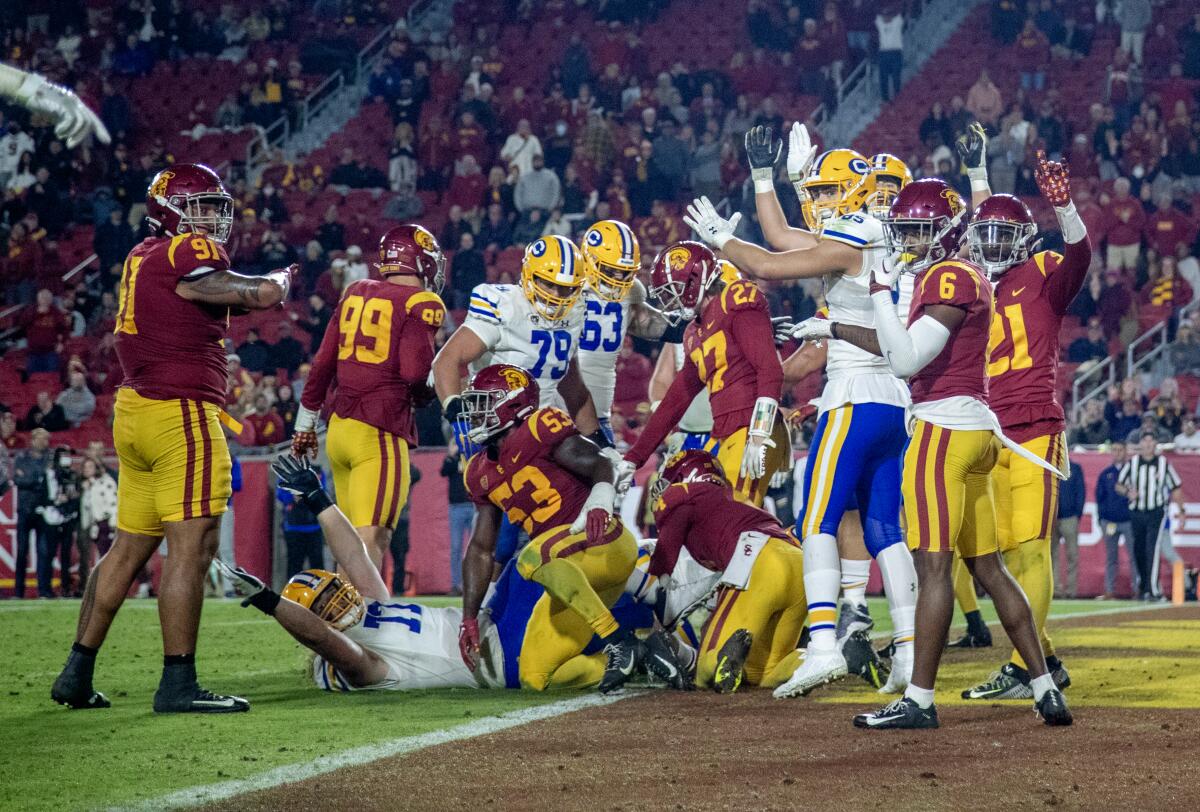
It should have been a favorable matchup for a maligned defense to get its swagger back, but after Cal racked up 469 yards and had its second-best scoring game of the season, USC’s defense is still searching for answers.
The Trojans had given up 500 yards in back-to-back games for the first time since 2013 and flirted with a third consecutive 500-yard game against a team that was averaging 23.4 points and 374.5 yards. USC showed flashes of promise by recovering from a 76-yard opening touchdown drive and giving up only 88 yards the rest of the first half.
But small mistakes — a blown coverage, a missed tackle, a penalty in the end zone that negated a third-down stop and led to a touchdown on the next play — piled up, allowing Cal to pull to within one touchdown twice.
“When you give a team momentum like that, you’re kind of asking for them to take advantage of it,” Riley said. “Then they did.”
Special teams
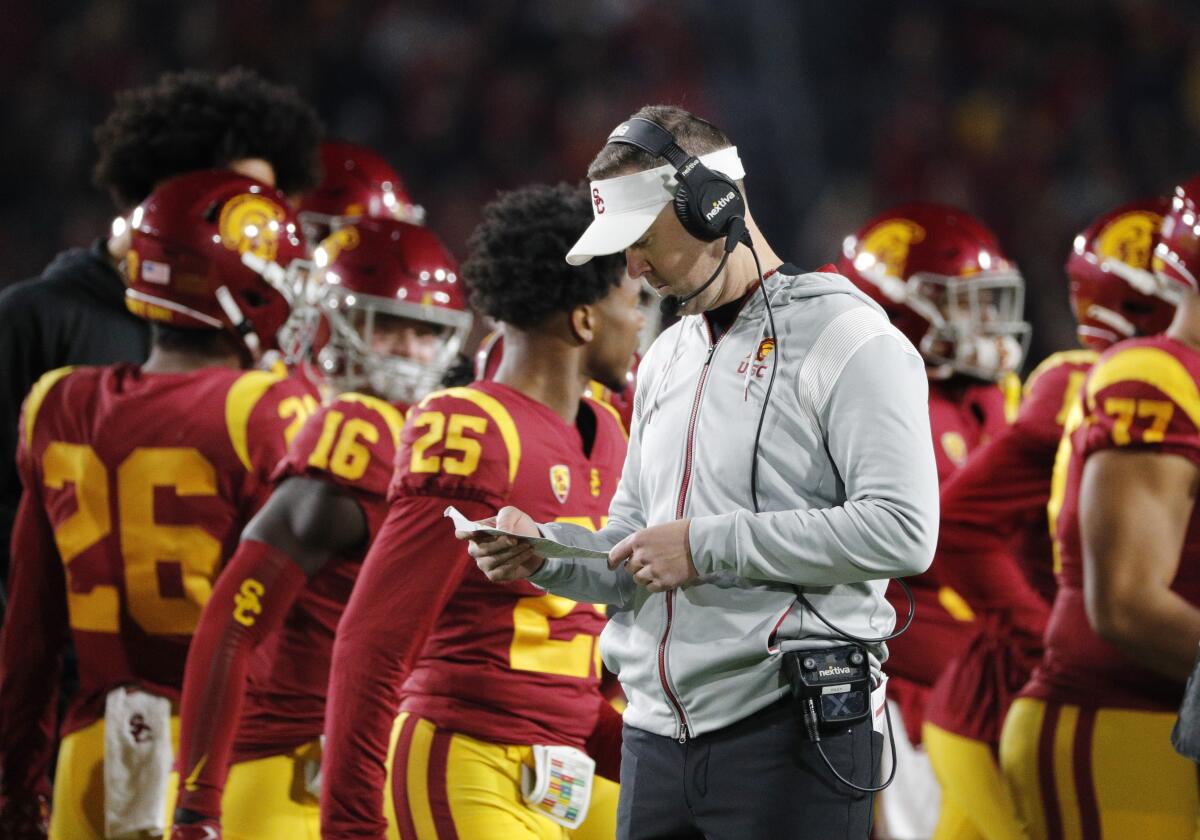
When asked of USC’s special teams performance Saturday, Riley shrugged.
“Some good and some bad,” the coach said.
The good included a blocked extra-point attempt by Nick Figueroa and an Austin Jones tackle on kickoff return that pinned Cal’s offense on its own eight-yard line. Riley noted a recovered onside kick that finally thwarted Cal’s comeback attempt.
But that moment to exhale wouldn’t have been necessary if the Trojans hadn’t already botched an onside kick attempt that allowed Cal to steal momentum and inch within one possession. Riley said it looked as if the Trojans were in position on the play but just didn’t recover the ball, allowing the Bears, who had just completed a 92-yard touchdown drive, to stay on the field. USC also had a bad snap on an extra-point attempt in the first quarter and Aadyn Sleep-Dalton punted five times without downing one inside the 20-yard line.
Scoreboard watching
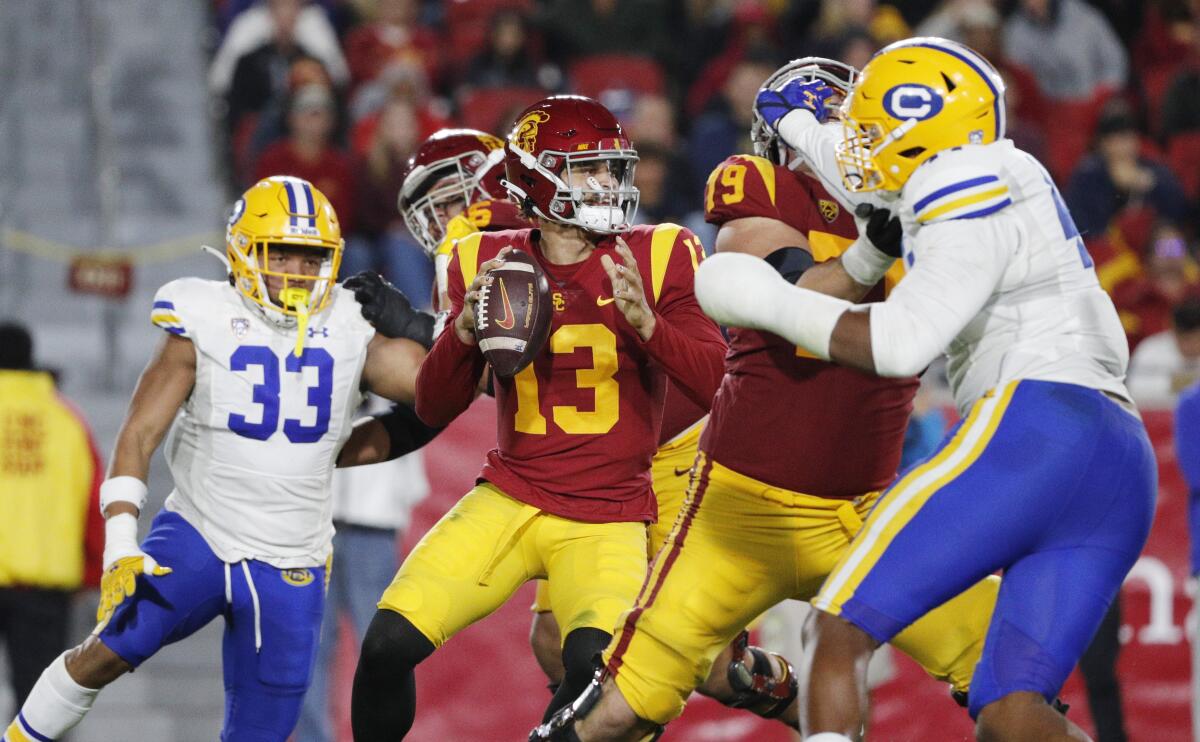
USC didn’t need for the clock to strike triple zeroes to secure a win Saturday night.
The Trojans got some help in their bid for the College Football Playoff semifinals from Notre Dame and No. 10 Louisiana State, which upset No. 4 Clemson and No. 6 Alabama, respectively. With two losses, the defending national champion Crimson Tide are effectively out of the playoff picture. Clemson might stay in contention as a one-loss ACC champion, but a one-loss Pac-12 champion, whether it’s Oregon, USC or UCLA, might be more desirable.
After years of being shut out of the playoff, the Pac-12 had five teams in the first CFP rankings, tied with the SEC and ACC for the most from any conference. But the Pac-12 has two teams — No. 8 Oregon and No. 9 USC — in the top 10 and four in the top 15 (UCLA at 12 and Utah at 14) compared to the ACC, which has four teams at 17 and lower.
Riley, who led Oklahoma to four playoff appearances, has experience with surviving as a one-loss team.
“We know we’re going to have to improve, but if you can improve by winning, you’ll be there in the end,” Riley said. “My experience with these things, you get to the end and no one remembers how.”
More to Read
Go beyond the scoreboard
Get the latest on L.A.'s teams in the daily Sports Report newsletter.
You may occasionally receive promotional content from the Los Angeles Times.




